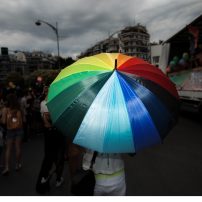
Police called lesbian women “sick” and “perverted” and carried out unwarranted physical searches. Conviction for degrading treatment of LGBT people.
JUDGMENT
Aghdgomelashvili and Japaridze v. Georgia 08.10.2020 (app.no. 7224/11)
SUMMARY
Police violence and LGBT community. Police operation in the office of an LGBT organization in Tbilisi. The applicants, who worked for the organization, complained that the police had insulted and threatened them, and that they had been subjected to degrading physical investigations. More specifically, the police officers insulted the women present, calling them “sick”, “perverted” and threatening to reveal their sexual orientation to the public. Women police officers conducted a physical search of almost all the women present.
The European Court of Human Rights has ruled unanimously that there have been breaches of Article 3 (prohibition of inhuman or degrading treatment) of the ECHR in conjunction with Article 14 (prohibition of discrimination) in relation to police abuse during the operation and the investigation.
The Court found that the State was responsible for the applicants’ homophobic and transphobic police violence and the lack of an effective investigation into the police misconduct.
Of particular interest to the Court was the fact that neither the police nor the Government had justified the physical searches, with the result that the Court ruled that their sole purpose was to embarrass the applicants because of their association with the LGBT community. .
The Court awarded each applicant EUR 2,000 for non-pecuniary damage.
PROVISIONS
Article 3
Article14
PRINCIPAL FACTS
The applicants, Ekaterine Aghdgomelashvili and Tinatin Japaridze, are Georgian nationals who were
born in 1969 and 1979 respectively and live in Tbilisi.
On 15 December 2009 around 17 police officers in civilian clothing rushed into the office of the LGBT
non-governmental organisation, the Inclusive Foundation, where preparations were being made for
an art exhibition. The officers announced that they were there to conduct a search, without showing
a search warrant or any other judicial order.
The applicants, who both worked for the NGO, and their colleagues submit that the police, on
realising that they were on the premises of an LGBT organisation, became aggressive. One of the
officers forcibly seized the first applicant’s mobile phone, while another said that he wished he could
burn the place down. The officers insulted the women present, calling them “sick”, “perverts” and
“dykes”, and threatened to reveal their sexual orientation to the public.
Female officers later proceeded to strip-search nearly all of the women present, including the
applicants. No records of the strip-searches were drawn up, and the women concerned all felt that
the measure had been carried out to humiliate them as the officers did not search the clothes they
were told to take off.
The applicants’ criminal complaint filed in January 2010 for police abuse is still ongoing. There has
been no reply to the applicants’ requests that they be granted victim status or that the investigating
authorities examine the allegedly discriminatory aspects of the police’s behaviour during the raid.
Relying on Article 3 (prohibition of inhuman or degrading treatment) and Article 14 (prohibition of
discrimination), the applicants alleged that the police had subjected them to physical and mental
abuse with clear homophobic and/or transphobic overtones, which had moreover been overlooked
in the course of the ensuing ineffective investigation.
THE DECISION OF THE COURT…
Article 3 (prohibition of inhuman and degrading treatment) and Article 14 (prohibition of
discrimination)
First, the Court examined the applicants’ complaint about the inadequacy of the Georgian
authorities’ investigation into the police raid. It reiterated that, when investigating ill-treatment, the
authorities had a duty to take all reasonable steps to unmask possible discriminatory motives.
However, the domestic authorities had not undertaken a single investigative act since the applicants
had lodged their criminal complaint in January 2010. Indeed, despite numerous requests, the
applicants had not even been declared victims.
The Court considered that such protraction in the investigation had exposed the authorities’
inability, or unwillingness, to examine the role played by homophobic and/or transphobic motives in
the alleged police abuse, against a background of Georgia’s well-documented hostility towards the
LGBT community.
It thus found that there had been a procedural violation of Article 3 taken in conjunction with
Article 14.
Secondly, it looked into the question of whether the State could be held responsible for the alleged
police abuse committed during the raid.
It considered that the applicants’ version of events, uncontested by the Government and confirmed
by clear and concordant eyewitness statements, had been established beyond reasonable doubt.
It went on to conclude that the police officers’ behaviour, motivated by homophobic and/or
transphobic hatred, had been grossly inappropriate. The officers had not only wilfully humiliated and
debased the applicants through hate speech, but had also made threats. Of particular concern were
the strip-searches, for which no reasons had ever been given either by the police or the
Government, leading the Court to conclude that their sole purpose had been to embarrass andpunish the applicants for their association with the LGBT community.
The police officers’ conduct had to have made the applicants feel fear, anguish and insecurity, which
had not been compatible with respect for their human dignity.
There had therefore also been a substantive violation of Article 3 taken in conjunction with
Article 14.
Other articles
The Court held that there was no need to examine the applicants’ complaints under Article 8 of the
Convention and Article 1 of Protocol No. 12 to the Convention.
Article 41 (just satisfaction)
The Court concluded that Georgia was to pay each applicant 2,000 euros (EUR) in respect of nonpecuniary damage.


